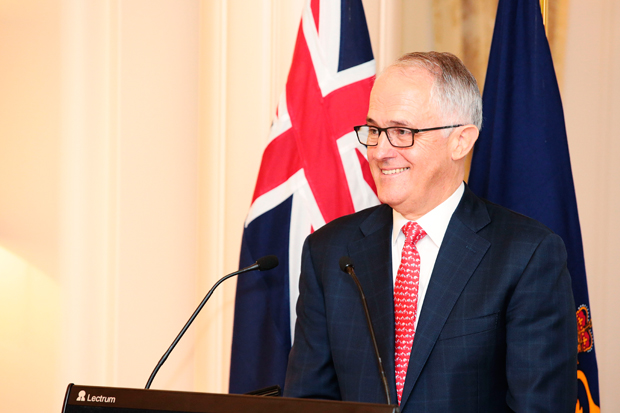I have a terrible confession to make. No, it is not that I was a bully at school, or even that I was bullied; nor that I have been depressed for years, suppressed some dark sexual peccadillo or shown prejudice against some harassed minority group. And I assuredly have not been and am not now ashamed of being an Australian. Nothing to confess under any of those headings. No, my confession is far worse than any of these possible candidates. And, what is more, I now want to come clean, put it all on the table and get some closure. My dark secret is that I am beginning to think that Malcolm Turnbull may not be so bad after all. There, I have said it and almost immediately I feel a wave of relief sweeping over me. Alright, I know I have criticised Turnbull for deposing Tony Abbott, and also for his ham-fisted reform of Senate voting, trying to steal money from superannuants by retrospective legislation, calling a double dissolution and conducting an election campaign in some strange foreign language known only to the cognoscenti. All that is true, and I do not withdraw a word of it. So what, I hear you say, is this Damascene event that has turned me from a sceptic into someone who thinks that Turnbull might come good and do some decent things after all or at least someone who should be given the benefit of the doubt and some encouragement to keep going. Well, it is not as if there is one single event that explains my change of heart, but rather that Turnbull has now taken a series of positions that show a genuine commitment to some good, basic principles on matters of great importance. And as far as I can see, it is not, as the press keep alleging with monotonous regularity, that this has come about because the right wing of the Liberal party has him in a Svengali-like trance where they only have to raise an eyebrow and he slavishly does their bidding. On the available evidence, and on his persistence, he seems genuine.
First, he has shown a firm commitment to bring extremist trade unions under the rule of law. It also seems to me that he is not just mouthing platitudes on this issue but genuinely believes in the cause. Then, he has made a commitment to cutting government spending, despite the howls of protest whenever an attempt is made to get people off the welfare teat. And the new refugee law is absolutely right. Moreover, he has stuck to the plebiscite on same sex marriage as a reasonable way of gauging public support for the proposed change to one of our most basic institutions. (He should have opposed same sex marriage outright, but you can’t have everything). Moreover, although I hate giving praise to politicians, he should be given credit for arguing for all four of these policies with enthusiasm. Most importantly, he has clearly come to the view that something must be done about the iniquitous section 18C and the conduct of the Human Rights Commission that veers between labyrinthine incompetence in the case of the QUT students and touting for business in the case of Bill Leak’s cartoon. He seems to have realised that section 18C is defining our perception of ourselves and the sort of society we are; at the moment that perception, and at least partially the reality, is that we are burdened by a severe law that restricts one of our basic freedoms, the freedom to speak our mind, whether we are bigots, hysterics or ratbags and that we are content to let that burden remain. Again, I think Turnbull is genuine in espousing the need for change in one form or another. At the same time, he has certainly committed himself to taming the monster that the HRC has become. We now know that the HRC inflicts sustained stress, financial cost and considerable disruption to the lives of anyone who is on the wrong end of a complaint, no matter how absurd or fanciful it may be. We also know that it prolongs the agony for defendants by taking an inordinate time to work out whether the complainant has made out a prima facie case or not. The Prime Minister has recognised these evils and should be encouraged to remove them. It will not be easy, but those of us who can help, should do so. It is extremely unlikely that the Senate will ever amend the Act in the way many of us would like. And here, I may as well say that tinkering around with words, taking some out and putting others in, would not be much of an improvement to anything; true change can only be achieved by repealing the whole section and all that goes with it. But there are at least three useful changes that could be made and which no-one could reasonably oppose. The first is to put a time limit on how long it takes the HRC to investigate a claim, so that after say three months, a complaint will automatically lapse if a prima facie case has not been made out by then or if, more likely, the HRC cannot make up its mind whether there is one or not. Secondly, there should be an automatic award of costs against a complainant who is found by a judge to have brought a manifestly baseless complaint. Thirdly, when a claim gets to court, there should be a jury trial, as the only way of testing whether the public is really outraged by the offending words or not. So let me throw into the public debate the notion that we should congratulate Turnbull on how far he has come on these different policies, urge him to keep it up and encourage him to continue to campaign for real reform. We could do worse.
The post Brown study appeared first on The Spectator.
Got something to add? Join the discussion and comment below.
Get 10 issues for just $10
Subscribe to The Spectator Australia today for the next 10 magazine issues, plus full online access, for just $10.
You might disagree with half of it, but you’ll enjoy reading all of it. Try your first month for free, then just $2 a week for the remainder of your first year.















Comments
Don't miss out
Join the conversation with other Spectator Australia readers. Subscribe to leave a comment.
SUBSCRIBEAlready a subscriber? Log in